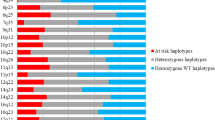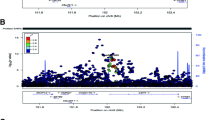Abstract
Large scale association studies have identified low penetrance susceptibility alleles that predispose to breast cancer. A locus on chromosome 8q24.21 has been shown to harbour variants that predispose to breast, ovarian, colorectal and prostate cancer. The finding of risk variants clustering at 8q24 suggests that there may be common susceptibility alleles that predispose to more than one epithelial cancer. The aim of this study was firstly to determine whether previously identified breast cancer susceptibility alleles are associated with sporadic breast cancer in the West of Ireland and secondly to ascertain whether there are susceptibility alleles that predispose to all three common epithelial cancers (breast, prostate, colon). We genotyped a panel of 24 SNPs that have recently been shown to predispose to prostate, colorectal or breast cancer in 988 sporadic breast cancer cases and 1,016 controls from the West of Ireland. We then combined our data with publicly available datasets using standard techniques of meta-analysis. The known breast cancer SNPs rs13281615, rs2981582 and rs3803662 were confirmed as associated with breast cancer risk (P allelic test = 1.8 × 10−2, OR = 1.17; P allelic test = 2.2 × 10−3, OR = 1.22; P allelic test = 5.1 × 10−2, OR = 1.15, respectively) in the West of Ireland cohort. For the remaining five breast cancer SNPs that were studied there was no evidence of an association with breast cancer in the West Ireland population (P allelic test > 6.5 × 10−2). There was also no association between any of the prostate or colorectal susceptibility SNPs, whether at 8q24 or elsewhere, with breast cancer risk. Meta-analysis confirmed that all susceptibility SNPs were site specific, with the exception of rs6983269 which is known to predispose to both colorectal and prostate cancer. This study confirms that susceptibility loci at FGFR2, 8q24 and TNCR9 predispose to sporadic breast cancer in the West of Ireland. It also suggests that low penetrance susceptibility SNPs for breast, prostate and colorectal cancer are distinct. Although 8q24 harbours variants that predispose to all three cancers, the susceptibility loci within the region appear to be specific for the different cancer types with the exception of rs6983269 in colon and prostate cancer.
Similar content being viewed by others
References
Antoniou AC, Easton DF (2006) Models of genetic susceptibility to breast cancer. Oncogene 25(43):5898–5905. doi:10.1038/sj.onc.1209879
Pharoah PD, Antoniou A, Bobrow M et al (2002) Polygenic susceptibility to breast cancer and implications for prevention. Nat Genet 31(1):33–36. doi:10.1038/ng853
Easton DF, Pooley KA, Dunning AM et al (2007) Genome-wide association study identifies novel breast cancer susceptibility loci. Nature 447(7148):1087–1093. doi:10.1038/nature05887
Hunter DJ, Kraft P, Jacobs KB et al (2007) A genome-wide association study identifies alleles in FGFR2 associated with risk of sporadic postmenopausal breast cancer. Nat Genet 39(7):870–874. doi:10.1038/ng2075
Stacey SN, Manolescu A, Sulem P et al (2007) Common variants on chromosomes 2q35 and 16q12 confer susceptibility to estrogen receptor-positive breast cancer. Nat Genet 39(7):865–869. doi:10.1038/ng2064
Stacey SN, Manolescu A, Sulem P et al (2008) Common variants on chromosome 5p12 confer susceptibility to estrogen receptor-positive breast cancer. Nat Genet 40(6):703–706. doi:10.1038/ng.131
Driver KE, Song H, Lesueur F et al (2008) Association of single-nucleotide polymorphisms in the cell cycle genes with breast cancer in the British population. Carcinogenesis 29(2):333–341. doi:10.1093/carcin/bgm284
Ma H, Jin G, Hu Z et al (2006) Variant genotypes of CDKN1A and CDKN1B are associated with an increased risk of breast cancer in Chinese women. Int J Cancer 119(9):2173–2178. doi:10.1002/ijc.22094
Amundadottir LT, Sulem P, Gudmundsson J et al (2006) A common variant associated with prostate cancer in European and African populations. Nat Genet 38(6):652–658. doi:10.1038/ng1808
Freedman ML, Haiman CA, Patterson N et al (2006) Admixture mapping identifies 8q24 as a prostate cancer risk locus in African–American men. Proc Natl Acad Sci USA 10338:14068–14073. doi:10.1073/pnas.0605832103
Gudmundsson J, Sulem P, Manolescu A et al (2007) Genome-wide association study identifies a second prostate cancer susceptibility variant at 8q24. Nat Genet 39(5):631–637. doi:10.1038/ng1999
Haiman CA, Patterson N, Freedman ML et al (2007) Multiple regions within 8q24 independently affect risk for prostate cancer. Nat Genet 39(5):638–644. doi:10.1038/ng2015
Yeager M, Orr N, Hayes RB et al (2007) Genome-wide association study of prostate cancer identifies a second risk locus at 8q24. Nat Genet 39(5):645–649. doi:10.1038/ng2022
Schumacher FR, Feigelson HS, Cox DG et al (2007) A common 8q24 variant in prostate and breast cancer from a large nested case–control study. Cancer Res 67(7):2951–2956. doi:10.1158/0008-5472.CAN-06-3591
Tomlinson I, Webb E, Carvajal-Carmona L et al (2007) A genome-wide association scan of tag SNPs identifies a susceptibility variant for colorectal cancer at 8q24.21. Nat Genet 39(8):984–988. doi:10.1038/ng2085
Zanke BW, Greenwood CM, Rangrej J et al (2007) Genome-wide association scan identifies a colorectal cancer susceptibility locus on chromosome 8q24. Nat Genet 39(8):989–994. doi:10.1038/ng2089
Ghoussaini M, Song H, Koessler T et al (2008) Multiple loci with different cancer specificities within the 8q24 gene desert. J Natl Cancer Inst 100(13):962–966. doi:10.1093/jnci/djn190
Witte JS (2007) Multiple prostate cancer risk variants on 8q24. Nat Genet 39(5):579–580. doi:10.1038/ng0507-579
Houlston RS, Peto J (2004) Genetics and the common cancers. In Eeles RA, Easton DF, Ponder BAJ, Eng C (eds) Genetic predisposition to cancer, 2nd edn, Arnold, London
Eeles RA, Kote-Jarai Z, Giles GG et al (2008) Multiple newly identified loci associated with prostate cancer susceptibility. Nat Genet 40(3):316–321. doi:10.1038/ng.90
Thomas G, Jacobs KB, Yeager M et al (2008) Multiple loci identified in a genome-wide association study of prostate cancer. Nat Genet 40(3):310–315. doi:10.1038/ng.91
Gudmundsson J, Sulem P, Rafnar T et al (2008) Common sequence variants on 2p15 and Xp11.22 confer susceptibility to prostate cancer. Nat Genet 40(3):281–283. doi:10.1038/ng.89
Jaeger E, Webb E, Howarth K et al (2008) Common genetic variants at the CRAC1 (HMPS) locus on chromosome 15q13.3 influence colorectal cancer risk. Nat Genet 40(1):26–28. doi:10.1038/ng.2007.41
Tenesa A, Farrington SM, Prendergast JG et al (2008) Genome-wide association scan identifies a colorectal cancer susceptibility locus on 11q23 and replicates risk loci at 8q24 and 18q21. Nat Genet 40(5):631–637. doi:10.1038/ng.133
Broderick P, Carvajal-Carmona L, Pittman AM et al (2007) A genome-wide association study shows that common alleles of SMAD7 influence colorectal cancer risk. Nat Genet 39(11):1315–1317. doi:10.1038/ng.2007.18
Tomlinson IP, Webb E, Carvajal-Carmona L et al (2008) A genome-wide association study identifies colorectal cancer susceptibility loci on chromosomes 10p14 and 8q23.3. Nat Genet 40(5):623–630. doi:10.1038/ng.111
Houlston RS, Webb E, Broderick P et al (2008) Meta-analysis of genome-wide association data identifies 4 novel susceptibility loci for colorectal cancer. Nat Genet (in press)
Hill EW, Jobling MA, Bradley DG (2000) Y-chromosome variation and Irish origins. Nat Genet 404(6776):351–352. doi:10.1038/35006158
Marchini J, Howie B, Myers S et al (2007) A new multipoint method for genome-wide association studies by imputation of genotypes. Nat Genet 39(7):906–913. doi:10.1038/ng2088
Higgins JP, Thompson SG, Deeks JJ, Altman DG (2003) Measuring inconsistency in meta-analyses. BMJ 327(7414):557–560. doi:10.1136/bmj.327.7414.557
Fletcher O, Johnson N, Gibson L et al (2008) Association of genetic variants at 8q24 with breast cancer risk. Cancer Epidemiol Biomarkers Prev 17(3):702–705. doi:10.1158/1055-9965.EPI-07-2564
Garcia-Closas M, Hall P, Nevanlinna H et al (2008) Heterogeneity of breast cancer associations with five susceptibility Loci by clinical and pathological characteristics. PLoS Genet 4(4):1–10. doi:10.1371/journal.pgen.1000054
Wang GY, Lu CQ, Zhang RM et al (2008) The E-cadherin gene polymorphism 160C-> A and cancer risk: a HuGE review and meta-analysis of 26 case-control studies. Am J Epidemiol 167(1):7–14
Qureshi HS, Linden MD, Divine G et al (2006) E-cadherin status in breast cancer correlates with histologic type but does not correlate with established prognostic parameters. Am J Clin Pathol 125(3):377–385
Masciari S, Larsson N, Senz J et al (2007) Germline E-cadherin mutations in familial lobular breast cancer. J Med Genet 44(11):726–731. doi:10.1136/jmg.2007.051268
Solé X, Hernández P, de Heredia ML et al (2008) Genetic and genomic analysis modeling of germline c-MYC overexpression and cancer susceptibility. BMC Genomics 9:12. doi:10.1186/1471-2164-9-12
Acknowledgments
We are grateful to the patients in the study and colleagues involved in patient ascertainment and sample collection. Help was also kindly provided by the Equipment Park, London Research Institute, Cancer Research UK. NM, GC and ST were funded by the National Breast Cancer Research Institute, Ireland. ES and AJ are funded by a Department of Health Clinician Scientist Grant, UK.
Author information
Authors and Affiliations
Corresponding author
Electronic supplementary material
Below is the link to the electronic supplementary material.
Rights and permissions
About this article
Cite this article
Mcinerney, N., Colleran, G., Rowan, A. et al. Low penetrance breast cancer predisposition SNPs are site specific. Breast Cancer Res Treat 117, 151–159 (2009). https://doi.org/10.1007/s10549-008-0235-7
Received:
Accepted:
Published:
Issue Date:
DOI: https://doi.org/10.1007/s10549-008-0235-7




